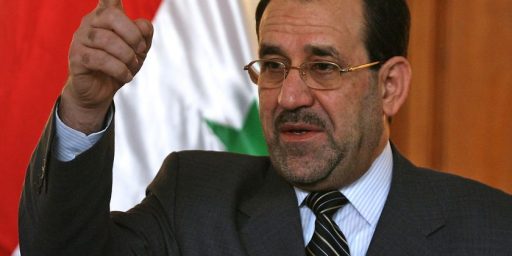Cutting Off the Sunnis to Spite Our Face?
WaPo fronts a Robin Wright report that the Bush administration is considering writing off Iraq’s Sunni population and just salvaging a Shiite state with a quasi-autonomous Kurd region in the north.
The proposal, put forward by the State Department as part of a crash White House review of Iraq policy, follows an assessment that the ambitious U.S. outreach to Sunni dissidents has failed. U.S. officials are increasingly concerned that their reconciliation efforts may even have backfired, alienating the Shiite majority and leaving the United States vulnerable to having no allies in Iraq, according to sources familiar with the State Department proposal.
Some insiders call the proposal the “80 percent” solution, a term that makes other parties to the White House policy review cringe. Sunni Arabs make up about 20 percent of Iraq’s 26 million people.
On the one hand, if reconciliation between two groups is impossible, writing off the much smaller group–especially if it has a history of repressing the other–may be the lesser of evils. Then again, the whole point of the post-regime change occupation/stabilization operation/counterinsurgency effort has been a neoconservative vision of a democratic Iraq that would serve as a shining beacon to the other Arab states. All of which are Sunni.
Not to mention the fact that the Saudis are threatening to intervene if the Sunnis are hung out to dry, setting up the very real possibility of a wider regional war.
To be fair, there is no indication in the piece that the proposal has any support within the administration, merely that they are “considering” it. This may just be something that has been thrown against the wall to see if it sticks.
I must say, the State Department is the last place from which I’d have expected to see this kind of suggestion emanating. Even more intriguing, State Department counselor Phil Zelikow is the author of this idea. He’s a smart guy and hardly on the lunatic fringe. I’d be really interested in hearing/reading more of his rationale.
Especially ironic is that the military seems to be solidly against this.
Opponents of the proposal cite three dangers. Without reconciliation, military commanders fear that U.S. troops would be fighting the symptoms of Sunni insurgency without any prospect of getting at the causes behind it — notably the marginalization of the once-powerful minority. U.S. troops would be left fighting in a political vacuum, not a formula for either long-term stabilization or reducing attacks on American targets.
Rather an understatement, I’d say.
None of the bloggers I’ve seen commenting on this — Steven Taylor, Kevin Drum, Ezra Klein, Matt Yglesias — on either Left or Right think any more of this idea than I do.





I despair of any formula for bringing Iraq’s Sunni Arabs (most of the Kurds are Sunnis, too) out of the margins. That’s been the problem since Saddam’s government fell in 2003.
They’re fighting for their way of life. There’s no other way they can restore the privileges they’ve come to expect. And they can always dabble with the political process during the day and set carbombs at night.
This problem of incentives has been there since the beginning. Partition won’t solve it.
Hm. State says that Sunni outreach has failed, but is that the same as backing the Shiites?
Laura Rozen’s sources tell her that Cheney’s office, plus NSC elements, are the Shiite fans. Which to me suggests why it was that the Saudis summoned Cheney to Riyadh.
So lets see what we got here.
We support the Shiites who are tied closely to Iran and Syria.
We are mortally opposed to Iran and Syria, and some want war.
We support the Kurds who really want independence.
A key component of our bedrock alliance, Turkey, is absolutely opposed to Kurdish independence.
We will toss the Sunnis overboard.
Our dealer, the Saudis, will arm and protect the Sunnis if needed.
Can someone explain to me how it would be possible, at any time over the next few generations, for someone to argue that the Republicans have any sort of natural affinity for, or competence in foreign or military affairs?
No. They don’t.
This has been another edition of Simple Answers to Simple Questions.
Actually, I see a convergence of positions coming.
Bush has said that we will stay until the job is done – _as long as the Iraqis want us there_.
Maliki has stated that he thinks his government can take over security by June 07.
His essential parlimentary ally, al-Sadr, wants us out as soon as possible. and has the forces that he could claim would enforce security.
Study Group is pushing for us to be mostly out within a year, as are Dems.
Everyone, both Dem and GOP wants this essentially over by 08, because no one wants it to be the focus of the presidential campaign, nor does any future president want to have to deal with this mess.
In that context, this Sunni dumping idea seems to be a way to gracefully (thats a joke) turn over the country to, what essentially will be the al-Sadr forces.
Maybe it will all work out for the best. Maybe the Iranians will be so grateful, that they will voluntarily give up their nukes.
Bush has pretty much served Iraq up to Iran on a platter. Pretty poor return for thousands of dead GIs and a half a trillion dollars…
Tano,
With due respect, the situation on the ground in Iraq is a mess of religious strife, tribal allegiances and the settling of old scores. This has nothing to do with Republican or Democratic foreign policy. The State Dept. is somewhat non-partisan and that is where these ideas are coming from. It also appears these are the same players and situations from Clinton’s presidency. Blaming Republicans for all the world’s ills doesn’t make sense.